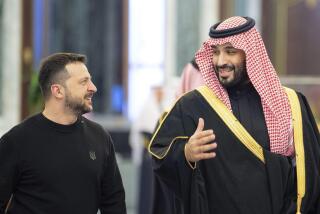Obama visits Saudi Arabia, stays mum on flogging
- Share via
Conveniently for President Obama, Saudi authorities postponed Friday’s planned flogging of Raif Badawi, thus making the president’s Tuesday visit to Riyadh slightly less awkward. Had the Saudi free speech advocate been literally under the lash within just a few days of the presidential pit stop, Obama might have been forced to say something about it in public just as he was meeting the new ruler of the desert monarchy, King Salman.
Such are the complications of the uneasy alliance between the United States -- a country that claims to be the world’s preeminent defender of human rights -- and Saudi Arabia -- one of the worst places on the planet for anyone who wants to exercise those human rights.
Saudi Arabia is a lovely place to live if you are a rich, male Muslim, but if you are a woman, a nonbeliever or a fan of democracy, watch out or you will end up like Raif Badawi. His crime was to create a website dedicated to free speech. His punishment is 10 years in prison and 1,000 lashes. The first 50 of those lashes were administered Jan. 10 in a public square in front of hundreds of onlookers who had just finished their Friday prayers.
The next round of 50 whacks had to be delayed because Badawi has not yet recovered from the first flogging. Apparently, that is what passes for mercy on the Arabian Peninsula. The U.S. State Department has branded Badawi’s punishment as “inhumane.” If this torture were being perpetrated by North Korea or Myanmar or Russia, the language would be much harsher and there might even be actions backing up the words. But Saudi Arabia will not face any consequence worse than an exasperated frown.
The Saudis get special treatment because, in a chaotic, violent region, Saudi Arabia is a rare island of stability. The Arab Spring that toppled dictators across the Mideast has turned into a deadly winter of anarchy, repression and extremism, from Libya and Egypt to Syria and Yemen. At the end of a 10-year American occupation, Iraq is a fractured mess with half the country in thrall to the vicious fanatics of Islamic State. It would not be a surprise if some American policymakers harbor a secret nostalgia for the simpler era when U.S. leaders were cozy with Arab authoritarians, such as Hosni Mubarak and Saddam Hussein.
The Saudis are the last autocrats left who can still exert some influence over the seismic drift of the Mideast. That’s why Secretary of State John F. Kerry, national security advisor Susan Rice, House Democratic leader Nancy Pelosi, Sen. John McCain and more than a dozen other top American officials accompanied the president on his Riyadh visit. They all wanted to express their condolences to the royal family upon the death of 90-year-old King Abdullah and to make the new king feel respected.
And any talk about Badawi and flogging was put aside. In a TV interview, Obama said it was necessary to balance the need to talk about human rights with pressing regional concerns. In other words, having a friend who jails and tortures champions of freedom may be embarrassing and hypocritical, but with terrorists on a roll and weak Arab governments trembling, a little embarrassment and hypocrisy are the necessary costs of keeping that one stable friend.
More to Read
A cure for the common opinion
Get thought-provoking perspectives with our weekly newsletter.
You may occasionally receive promotional content from the Los Angeles Times.







